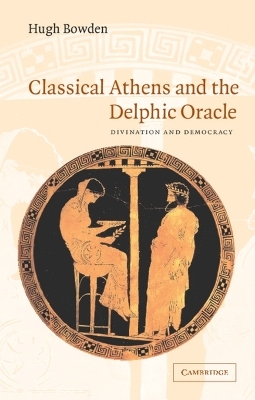
Classical Athens and the Delphic Oracle
Divination and Democracy
Seiten
2005
Cambridge University Press (Verlag)
978-0-521-53081-1 (ISBN)
Cambridge University Press (Verlag)
978-0-521-53081-1 (ISBN)
This book explores the Delphic Oracle and the use made of it by the city of Athens, challenging traditional assumptions about Athenian democracy. Accessible and comprehensive in its discussion of the consultations, it is required reading for students of the oracle itself and of Athenian democracy.
The Delphic Oracle was where, according to Greek tradition, Apollo would speak through his priestesses. This work explores the importance placed on consultations at Delphi by Athenians in the city's age of democracy. It demonstrates the extent to which concern to do the will of the gods affected Athenian politics, challenging the notion that Athenian democracy may be seen as a model for modern secular democratic constitutions. All the known consultations of the oracle by Athens in the period before 300 BC are examined, and descriptions of consultations found in Attic tragedy and comedy are discussed. This work provides a new account of how the Delphic oracle functioned and presents a thorough analysis of the relationship between the Athenians and the oracle, making it essential reading both for students of the oracle itself and of Athenian democracy.
The Delphic Oracle was where, according to Greek tradition, Apollo would speak through his priestesses. This work explores the importance placed on consultations at Delphi by Athenians in the city's age of democracy. It demonstrates the extent to which concern to do the will of the gods affected Athenian politics, challenging the notion that Athenian democracy may be seen as a model for modern secular democratic constitutions. All the known consultations of the oracle by Athens in the period before 300 BC are examined, and descriptions of consultations found in Attic tragedy and comedy are discussed. This work provides a new account of how the Delphic oracle functioned and presents a thorough analysis of the relationship between the Athenians and the oracle, making it essential reading both for students of the oracle itself and of Athenian democracy.
Hugh Bowden is Lecturer in Ancient History at King's College London. He is the author of numerous articles on Greek religion and history and is editor of The Times Ancient Civilizations (2002).
Introduction; 1. How did the Delphic oracle work?; 2. What did the Athenians think of the Delphic Oracle?; 3. What did historians and philosophers say about the Delphic oracle?; 4. How and why did the Athenians consult the Delphic oracle?; 5. What did the Athenians ask the Delphic oracle?; 6. Why did the Athenians (and other Greek cities) go to war?; 7. Conclusion: divination and democracy; Appendix 1. Consultations of Delphi in Attic tragedy; Appendix 2. Concordance of Athenian consultations.
| Erscheint lt. Verlag | 5.5.2005 |
|---|---|
| Zusatzinfo | 3 Tables, unspecified; 2 Maps; 11 Halftones, unspecified |
| Verlagsort | Cambridge |
| Sprache | englisch |
| Maße | 138 x 216 mm |
| Gewicht | 260 g |
| Themenwelt | Geschichte ► Allgemeine Geschichte ► Vor- und Frühgeschichte |
| Geisteswissenschaften ► Philosophie ► Philosophie Altertum / Antike | |
| ISBN-10 | 0-521-53081-4 / 0521530814 |
| ISBN-13 | 978-0-521-53081-1 / 9780521530811 |
| Zustand | Neuware |
| Informationen gemäß Produktsicherheitsverordnung (GPSR) | |
| Haben Sie eine Frage zum Produkt? |
Mehr entdecken
aus dem Bereich
aus dem Bereich
Was Pompeji über uns erzählt
Buch | Hardcover (2023)
Propyläen (Verlag)
32,00 €
auf den Spuren der frühen Zivilisationen
Buch | Hardcover (2023)
C.H.Beck (Verlag)
20,00 €


